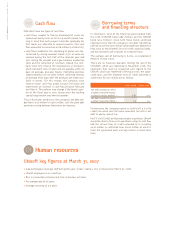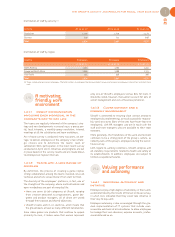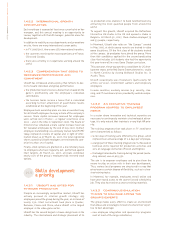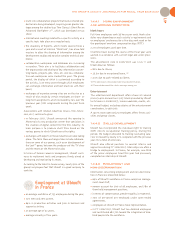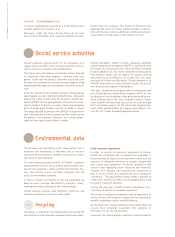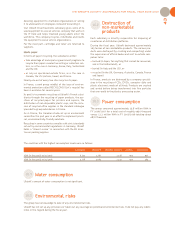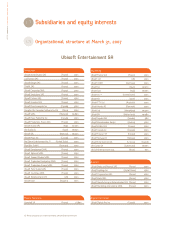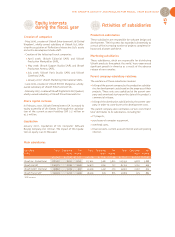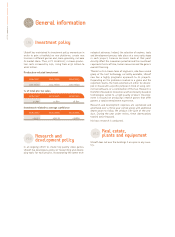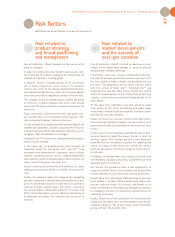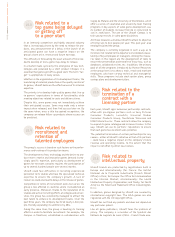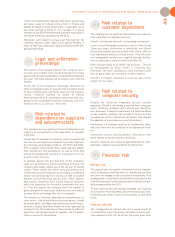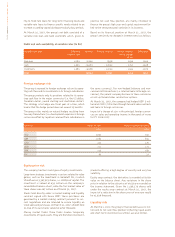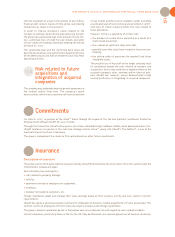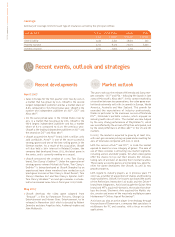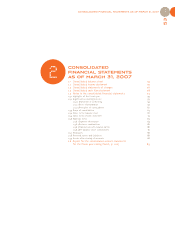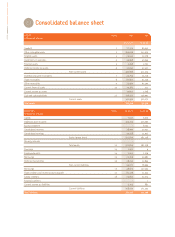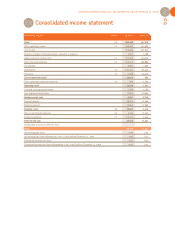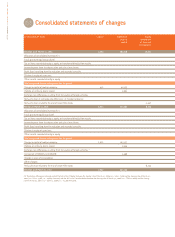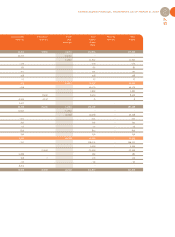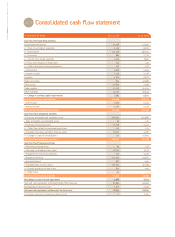Ubisoft 2006 Annual Report Download - page 60
Download and view the complete annual report
Please find page 60 of the 2006 Ubisoft annual report below. You can navigate through the pages in the report by either clicking on the pages listed below, or by using the keyword search tool below to find specific information within the annual report.
UBISOFT • FINANCIAL REPORT 2007
Risk related to a
top game being delayed
or getting off
to a poor start
In an intensely competitive and highly seasonal industry
that is increasingly driven by the need to release hit pro-
ducts, any announcement of a delay in the launch of an
anticipated game can have a negative impact on the
group’s share price, revenue and future earnings.
The difficulty in forecasting the exact amount of time nee-
ded to develop or test a game may delay its release.
In a market made cyclical by the emergence of new tech-
nologies and penalized by a short product lifespan, it is
essential that games get off to a good start. The term “tar-
get” is appropriate in many senses.
Whether in the organization of its development teams, the
monitoring of external production or the quality control of
its games, Ubisoft banks on the effectiveness of its internal
expertise.
The priority is to develop high-quality games that live up
to gamers’ expectations in terms of functionality while
meeting objectives related to costs and delivery times.
Despite this, some games may not immediately achieve
their anticipated success. Some may make only a minor
impact when released, and then find success later on. By
the same token, once a title has gained recognition, the
company can release follow-up products whose success can
be predicted.
Risk related to
recruitment and
retention of
talented employees
The group’s success is based on such factors as the perfor-
mance and training of its production teams.
The development of new technology and the desire to pro-
duce more creative and innovative games demand increa-
singly specific expertise, particularly as development of
games for next-gen consoles requires the participation of
up to several hundred people over several months.
Ubisoft could face difficulties in recruiting experienced
personnel to its studios who have the specialized technical
expertise to ensure the company’s growth. A lack of
resources could also lead to delays in the release of games.
Competition in terms of recruitment exists but varies: the
group is less affected in countries where it established an
early presence. Moreover, thanks to the reputation of its
studios and active recruiting efforts at colleges and univer-
sities, the group has consistently managed to attract the
best talent to enhance its development teams. Over the
past three years, the company has hired nearly 1,600 peo-
ple, thereby expanding its workforce by 68%.
Along the same lines, the group is boosting its training
efforts in order to facilitate recruitment. For example, the
Campus in Montreal, established in collaboration with
Cegep de Matane and the University of Sherbrooke, which
offers a series of vocational and university-level training
programs in key aspects of video game development, saw
its number of students increase from 69 in 2005/2006 to
116 in 2006/2007. The aim of the Ubisoft Campus is to
train young recruits in video game disciplines.
All these measures will allow Ubisoft to attain its objective
of hiring 500 to 600 people per year. This past year, 493
employees joined the group.
The company is currently organized in such a way as to
minimize risk related to the departure or extended unavai-
lability of key employees or managers. Among the measu-
res taken in this regard are the development of tools to
ensure the preservation and transfer of know-how, such as
databases, collaborative sites, etc. In addition, the primary
goal of all the programs introduced by Human Resources
at the group level is to attract, train, retain and motivate
employees who have strong technical and managerial
skills. These programs include stock option plans, group
savings plans and development plans.
Risk related to the
termination of a
contract with a
licensing partner
Each year, Ubisoft signs numerous partnership contracts,
often with prestigious partners such as Sony Pictures
Consumer Products, LucasArts, Universal Studios
Consumer Products Group, Touchstone Television and
MGM Interactive Inc. These contracts allow the company
to expand its game catalogue and increase its sales. In this
way, Ubisoft can use its partners’ reputations to ensure
that each game has excellent sales potential.
The potential termination of certain partnerships for any
reason – either at Ubisoft’s initiative or that of its partners
– could have a negative impact on the company's future
revenue and operating income, to the extent that this
impact is not offset by other new licenses.
Risk related to
intellectual property
Ubisoft brands are protected by registrations both in
Europe and internationally (for France: the Institut
National de la Propriété Industrielle [French Patent
Office] in Paris; for Europe: the Office for Harmonization
in the Internal Market; internationally: the World
Intellectual Property Organization; and finally, for North
America: the Patent and Trademark Office in Washington,
D.C.).
In addition, games designed by Ubisoft are covered by
international copyright laws. The AAA games are also
registered with the US Copyright Office.
Ubisoft has not filed any patents and does not depend on
any particular patent.
Like all game publishers, Ubisoft faces the problem of
piracy. The company is a member of the Syndicat des
Editeurs de Logiciels de Loisirs (SELL - French trade asso-
1.9.6
1.9.4
1.9.5
1.9.3


